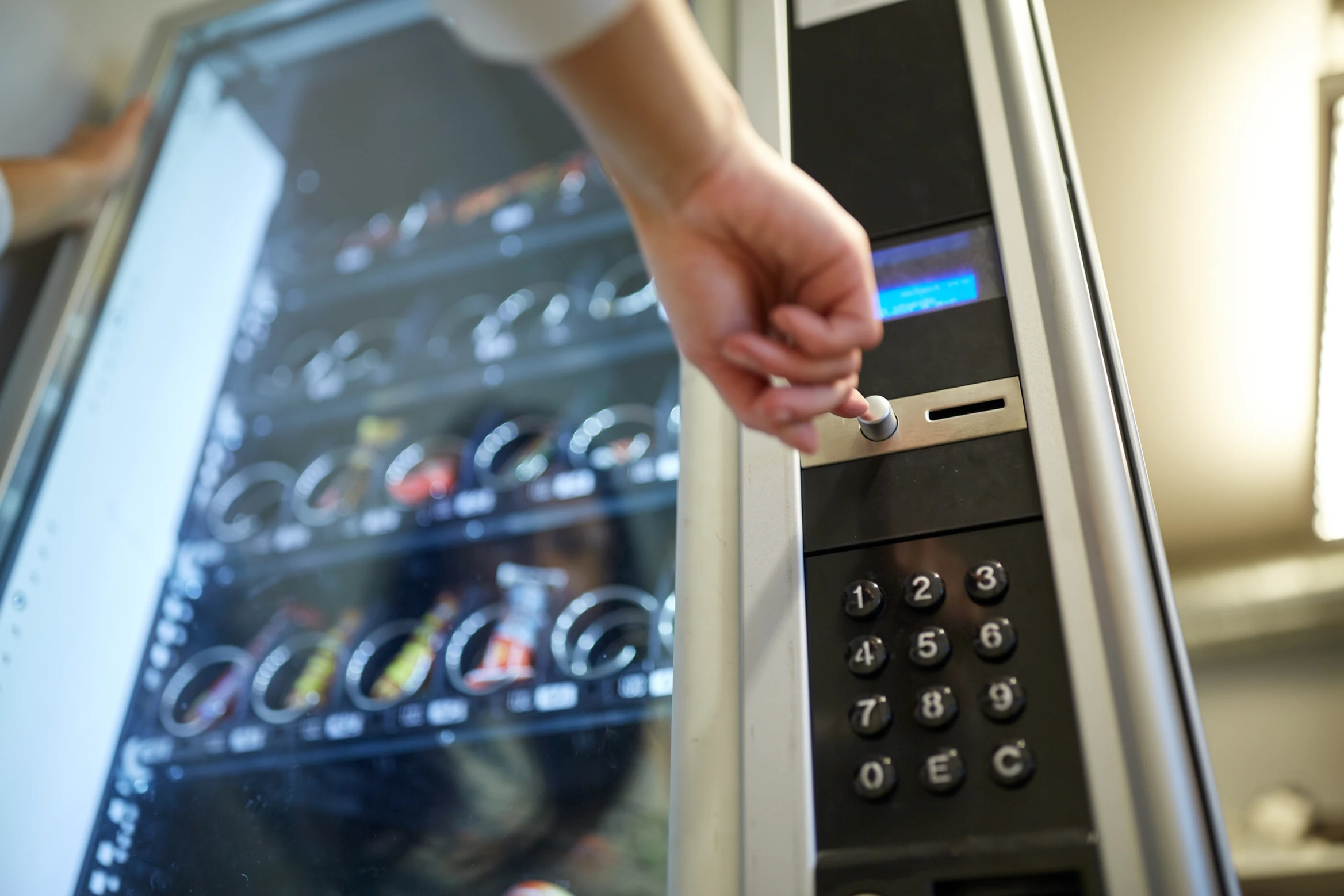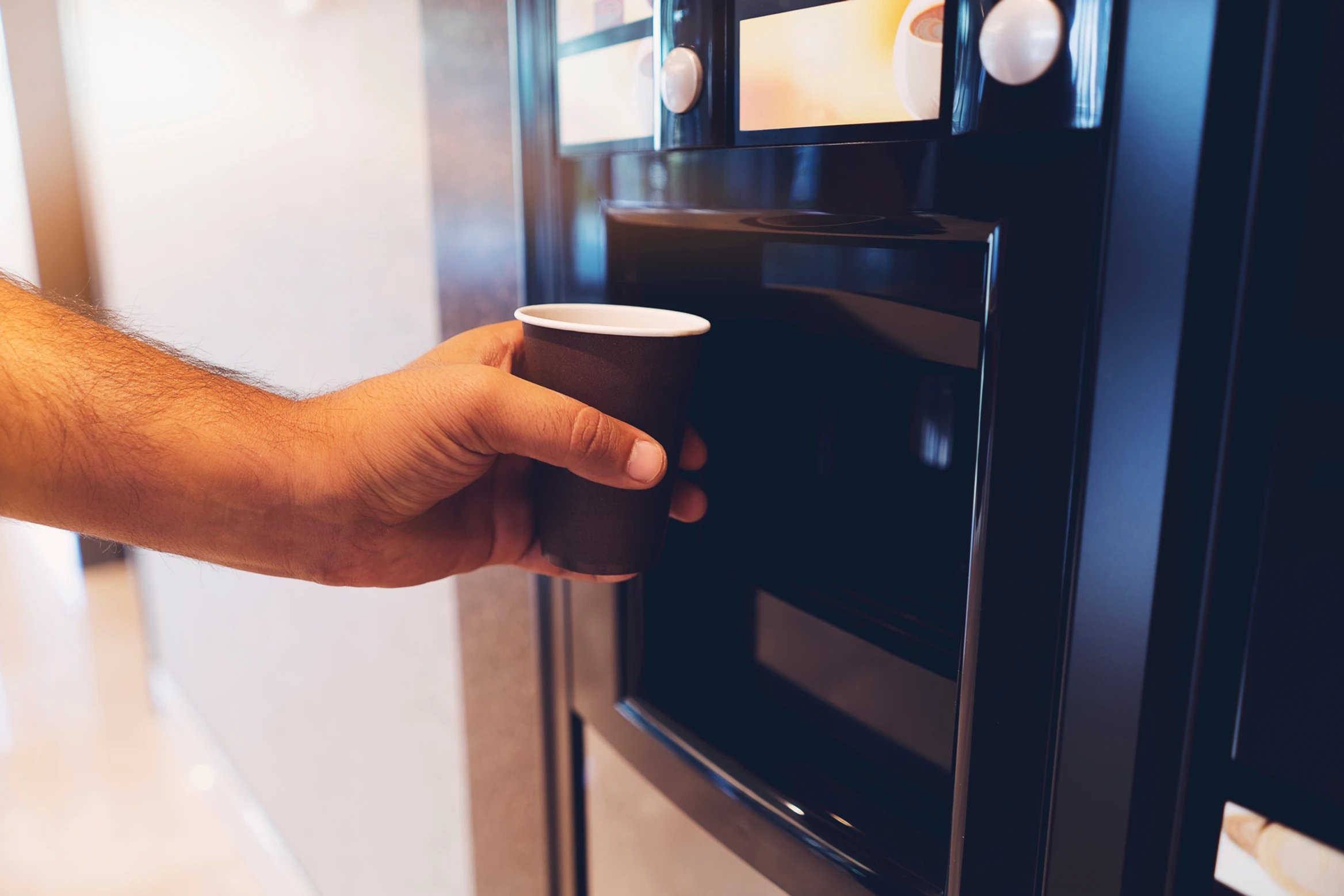Refreshment focuses on the water dispenser/cooler, office coffee service and vending sectors, while also taking an in-depth look into products for vending from bottled water and drinks, to snacks and confectionery. It also focuses on hydration, health and wellness, new technologies and environmental and social responsibility issues.
Research
Coffee & tea

Refreshment brings you monthly updates on the latest news and insights from our member associations in the vending, coffee and water sectors. Featuring insights from industry leaders, this round-up highlights key developments, events and initiatives shaping the future of these industries, providing essential information on emerging trends and regulatory changes.
Vending and coffee updates
The vending, automated retail and coffee sectors are rapidly evolving, with new initiatives, industry events and regulatory developments shaping its future. Here’s what’s happening in this sector this month:
The Vending & Automated Retail Association (AVA):
UK vending sector surpasses pre-pandemic revenue, AVA report shows
The UK’s vending, coffee services and automated retail sector has exceeded pre-pandemic revenue levels for the first time, according to the 2024 Census & Market Report published by the AVA.
The report reveals that product revenue rose by more than 13% year-on-year, reaching £2.14 billion in 2024. When related categories are included, the industry’s total value now exceeds £3 billion.

Key findings from the report include:
Fresh food sales through vending machines grew significantly, with volume up 16% and value up 28%, now representing a £73 million market.
Micro markets increased by 11% to 730 sites, while the number of smart fridges surged 56% to 1,920 units.
Cashless payment adoption continued to rise, with 90% of pay vend machines now cashless-enabled. Cashless transactions now account for 80% of sales, with 57% of those made via mobile payment. Transactions made using cashless methods were more than 90% higher in value than those using cash.
David Llewellyn, CEO of the AVA, said: “Surpassing pre-Covid revenue levels is a tremendous industry-wide achievement and reflects five years of hard graft, dedication and resilience from AVA members and operators across the UK. Despite ongoing economic challenges and changing workplace behaviours, vending and automated retail businesses have consistently adapted to shifting demand and continued to invest in technology and innovation.”
Additional trends highlighted in the 2024 report include:
Continued growth in coffee-to-go, with an expanded product range that includes iced drinks, premium teas and flavoured options.
Increased use of semi-automatic tabletop hot drinks machines, particularly those using liquid milk, aligning with consumer preferences for higher-quality beverages.
Decline in usage across traditional business and industry (B&I) sites, offset by growth in hospitality, retail, transport and the rise of unattended retail formats like smart fridges.
Llewellyn added: “Our 2024 Census reinforces the dynamic nature of vending and automated retail, underpinned by innovation, data and customer-centric evolution. As an association, we’ll continue to support our members with insight, advocacy, and tools to remain competitive in the face of ongoing challenges, including regulatory complexity, a tightening economic outlook and rising costs."
“These factors, combined with legislative uncertainty, mean maintaining agility and informed strategy will be more important than ever as we move through 2025 and beyond.”
The AVA’s 2024 report, compiled by Colston Consultants, is based on data from over 150,000 machines – representing over a third of the UK’s total machine base – and is available to AVA members.
European Vending & Coffee Service Association (EVA)
EVA and Common Smartcard Solutions Association form strategic partnership on payment standardisation

EVA and the Common Smartcard Solutions Association have entered into a mutual partner membership agreement to advance the standardisation of closed-loop payment systems within the vending and office coffee service sectors.
The partnership will see both associations align their work plans and exchange technical knowledge to promote greater interoperability and long-term compatibility in payment technologies.
The Common Smartcard Solutions Association, based in Germany, focuses on creating standardised data structures for RFID-based applications. Central to its work is the openCashfile format – a shared smartcard data structure designed to simplify integration, increase transparency and provide investment security. The system is already in use across institutional catering, campus facilities, leisure centres and access control environments.
The EVA director general, Erwin Wetzel, stated that “by aligning efforts, the EVA and Common Smartcard aim to strengthen the foundations for secure, standardised, and interoperable payment solutions across Europe.”
Several EVA members are also part of the Common Smartcard Association, which now officially joins EVA as a partner member.
National Automatic Merchandising Association (NAMA)
The NAMA Show 2025 closes with record attendance and industry highlights in Las Vegas

The NAMA Show 2025 concluded earlier this month with its highest turnout in over 20 years, drawing more than 5,200 industry professionals to Las Vegas for three days of exhibitions, education and networking. The event showcased developments across vending, micro markets, pantry services and self-serve retail.
Kristen Griffith, VP of programmes and services of NAMA, said: "This year’s show captured the energy and innovation driving our industry – not just in technology, but in the customer experience, product diversity and service excellence".
"From engaging education sessions to a buzzing show floor, The NAMA Show proved once again why it’s the place to be for anyone in convenience services. This is your opportunity to lead, connect and grow in the midst of a highly engaged, decision-making audience."
Among the key attractions was Imagination Way, which featured model environments demonstrating real-world applications of unattended retail – ranging from workplace refreshment hubs to airport kiosks and micro markets for mixed-use buildings.
Attendees explored model set-ups of: Unattended retail solutions on campuses; breakrooms and workplace refreshment zones reimagined as wellness hubs; tech-enabled retail zones in airports, hotels and transit hubs; and micro markets tailored for small offices and mixed-use buildings.
A dedicated Snap-eligible micro market also drew attention for its focus on expanding food access through policy-aligned innovation.
The show also hosted a full schedule of educational sessions, covering topics such as:
Harnessing AI and automation across operations.
Leveraging retail analytics for customer engagement.
Trends in consumer preferences, flavor profiles, and packaging.
Building strong brands in a competitive landscape.
Sustainability, workforce development and more.
Following this year’s success, NAMA announced plans for The NAMA Show 2026, set to take place in Los Angeles, US.
Beverage Standards Association (BSA)
BSA hosts networking event at Sanremo Coffee London
The Beverage Standards Association (BSA) recently held a networking event at Sanremo Coffee in London, bringing together members and industry professionals to exchange ideas and strengthen connections.
The event aimed to encourage collaboration among BSA members and provided a space for discussion around shared initiatives. Sanremo Coffee hosted the gathering at its London site.
The BSA said networking events play an important role in maintaining engagement with members and supporting collaboration across the sector.
BSA said: "Sanremo in London were exceptional hosts, and provided an excellent space for our members to network and learn. Connecting with our members is vital to the BSA, and our networking events are a great opportunity to foster relationships, exchange ideas, and collaborate on future initiatives. Thank you to everyone who attended and contributed to making the event a success!”
Water updates

Water Dispenser & Hydration Association (WHA)
WHA members prepare for summer demand with focus on safe hydration
As the UK enters the warmer months, members of the WHA are preparing for increased demand for hydration solutions across workplaces, events and construction sites.

WHA businesses are scaling up logistics and services to meet seasonal demand for water dispensers and bottled water. With a focus on safety and compliance, the association highlights the importance of accredited providers in delivering reliable hydration.
Tracy Corroll, technical manager at the WHA, said: “Our members don’t just deliver water – they deliver confidence. Whether it’s a plumbed-in system in a busy office or a bottled water cooler at an event, consumers and businesses can trust WHA members to provide compliant, safe, high-quality hydration solutions.”
The WHA says proper hydration is particularly critical during the summer, as dehydration can impact concentration, performance and overall wellbeing. Accredited members follow a strict Code of Practice and undergo annual audits, training and safety checks.
Representing suppliers, manufacturers, bottlers and distributors in the UK’s water dispenser sector, the WHA is encouraging businesses and event organisers to look for its logo when sourcing hydration services this summer.
Natural Mineral Waters Europe (NMWE)
NMWE and IUCN launch biodiversity guidance for mineral water sector
NMWE and the International Union for Conservation of Nature (IUCN) have released a new guidance document to help mineral and spring water producers enhance biodiversity protection in catchment areas around water sources.
The report, titled Biodiversity in Natural Mineral Waters: Measuring the Sector's Contribution to Nature Positive, offers practical tools to support companies in assessing their biodiversity impact and aligning their strategies with legal and voluntary frameworks, including the Kunming-Montreal Global Biodiversity Framework.
The guidance aims to formalise and expand the sector's existing efforts to safeguard ecosystems that support clean and abundant freshwater. It provides a flexible framework for companies – ranging from multinationals to small-scale producers – to develop context-specific biodiversity plans, promote watershed-level collaboration and contribute to regional and global conservation goals.
Alessandro Pasquale, president of NMWE, said: “NMWE’s collaboration with IUCN reflects our sector’s deep-rooted values and long-term vision. We recognise that protecting biodiversity is essential not only to the integrity of our product, but also to the resilience of our planet."
"Natural mineral water companies depend on clean and abundant freshwater – a resource supported by healthy ecosystems. These ecosystems regulate water quality, maintain reliable flows and ensure the long-term viability of water sources.”
James Dalton, global director for the IUCN's water and wetlands team, commented: “Natural mineral water producers have an important role to play as stewards of freshwater ecosystems, which is why IUCN partnered with NMWE to co-develop some practical guidance for their members to contribute to nature positive actions through their policies and practices."
"The guide is the culmination of a two-year collaboration, and it is critical to maintain the momentum initiated with this work if we are to catalyse the change needed to safeguard European basins.”
NMWE said the framework fulfils a commitment made under the EU Code of Conduct for Responsible Food Business and Marketing Practices. “In the next step, we will focus on dissemination and partnership building,” added Patricia Fosselard, secretary general of NMWE.
NMWE to host EU Green Week event on Deposit Return Systems

NMWE will host a partner event during EU Green Week focused on the role of Deposit Return Systems (DRS) in advancing the EU’s circular economy and supporting targets under the Packaging and Packaging Waste Regulation (PPWR).
The session, titled 'Deposit Return Systems | Delivering on Circularity Post-PPWR, will take place on 2 June 2025, from 11:00 to 12:30, at the Permanent Representation of Lithuania to the EU in Brussels. A networking lunch will follow the discussion.
Speakers include Wolfgang Trunk from the European Commission, Clarissa Morawski of Reloop, Raymond Gianotten from OLHC, and a representative from Lithuania who will share insights on the country’s DRS framework.
Registration is open until 29 May 2025 at noon.
International Bottled Water Association (IBWA)
Bottled water leads US beverage market in 2024 with strongest volume growth

Bottled water maintained its position as the most consumed packaged beverage in the US for the ninth consecutive year, according to new data from Beverage Marketing Corporation (BMC). In 2024, bottled water saw a 2.9% increase in volume, reaching 16.4 billion gallons, outperforming nearly all other beverage categories, most of which declined.
In contrast, carbonated soft drinks reached 11.9 billion gallons with just 0.2% growth. Energy drinks grew by 1.6%, while sports drinks dropped by 2.7%, ready-to-drink coffee fell 2.3%, fruit beverages declined 2.5% and both value-added water and ready-to-drink tea dropped 1.3%.
Retail sales of bottled water hit $50.6 billion in 2024, up 3.7% from the previous year.
John G Rodwan, Jr, BMC’s editorial director, said: “Though sometimes regarded as competing with tap water, bottled water actually achieved its position as the biggest beverage category by enticing consumers away from other packaged beverages. Some consumers may have transitioned away from regular, full-calorie sodas in favor of their diet (or ‘zero-sugar’) iterations, but many others opted for bottled water instead. And as some consumers grew leery of artificial sweeteners, they moved away from diet sodas as well as regular versions."
“Bottled water’s zero-calorie status and its lack of artificial ingredients appeal to many consumers. Even where tap water may be safe and readily available, people may prefer bottled water. The availability of packaged water wherever beverages are sold also differentiates bottled water from tap.”
Jill Culora, IBWA’s vice president of communications, commented: “Whether consuming refreshing, high-quality water from a three- or five-gallon jug and watercooler or picking up a convenient, resealable, grab-and-go PET container, bottled water offers a healthy and smart choice. Consumers who choose bottled water know both options can lessen their personal environmental footprints when they choose water over other packaged drinks."
"Watercoolers provide thirst-quenching water from three- and five-gallon containers that are collected, cleaned, sanitised and reused 35-plus times before being recycled. And the market’s most popular, individual-sized PET plastic bottle is not only the most recognized as being recyclable but also the most common item in curbside bins (53%), making it easy for consumers to make the right choice and recycle rather than trash empty bottles."
Americans consumed an average of 47.3 gallons of bottled water per person in 2024, continuing a trend that began in 2016 when bottled water first surpassed soft drinks in volume.
Culora added: “Consumer preference for convenient, safe, and healthy bottled water is good news for public health. This is particularly important as the nation continues to experience high rates of obesity, diabetes and heart disease.”
“Helping people make healthier choices is at the core of the bottled water business. Consumers have made it clear that there’s a demand for safe, healthy, and convenient bottled water, as they are responsible for propelling bottled water to the title of America’s most popular packaged beverage, by volume.”
.png)

%20(1).jpg)

















